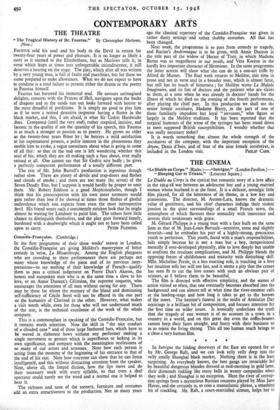Comedie-Francaise. (Cambridge.)
IN the first programme of their three weeks' season in London, the Comedie-Francaise are giving Moliere's masterpiece of bitter comedy in verse, Le Misanthrope. Among the English playgoers who are crowding to these performances there are perhaps not many whose knowledge of the piece and of its previous inter- pretations—to say nothing of their knowledge of French—qualify them to pass a critical judgement on Pierre Dux's Alceste, the honest and outspoken man who is at the same time a slave to his love, or on Annie Ducaux's Celimene, the supreme coquette, who encourages the attentions of all men without caring for any. There may be those for whom the memory of the bland and dominating self-sufficiency of Cecile Sorel will not be effaced in the one part or the humanity of Clariond in the other. However, what makes a visit worth while, even for those who will not understand much of the text, is the technical excellence of the work of the whole company.
This is a commonplace in speaking of the Comedie-Francaise, but it remains worth attention. Note the skill in " the nice conduct of a clouded cane" and of those large feathered hats, which have to be waved in elaborate bows without any performer making a single movement or gesture which is superfluous or lacking in its own significance, and compare with the meaningless restlessness of so many of our actors and actresses. Note how each person is acting from the moment of the beginning of his entrance to that of the end of his exit. Note how everyone can show that he can listen intelligently, and this without distracting attention from the speaker. Note, above all, the limpid diction, how the lips move and do their necessary work with every syllable, so that even a deaf spectator could surely see the word and a normal one is helped to hear it.
The richness and taste of the scenery, furniture and costumes add an extra attractiveness to the production. Not so many years ago the classical repertory of the Comedie-Francaise was given in rather dusty settings ' and rather shabby costumes. All that has been changed.
Next week, the programme is to pass from comedy to tragedy, and Racine's Andrornaque is to be given, with Annie Ducaux in the title part of the widow of Hector of Troy, in which Madame Bartet was so magnificent in our youth, and Vera Korene in the hardly less important character of Hermione. In the same programme the latter actress will show what she can do in a one-act trifle by Alfred de Musset. The final week returns to Moliere, this time in prose and not in verse and in a broader tone, which is almost farce, but still has its touch of bitterness ; for Moliere wrote Le Malade Imaginaire, and its fun of doctors and the patients who are slaves to them, at a time when he was already in doctors' hands for the illness of which he died on the evening of the fourth performance, after playing the chief part. In this production we shall see the senior female societaire, Madame Bretty, in the part of one of those familiarly impudent but loyal " servantes," who figure so largely in the Moliere tradition. It has been reported that the surgical humours of the scene of the syringes has been toned down to meet supposed British susceptibilities. I wonder whether that was really necessary today?
It is worth remarking that almost the whole strength of the societaires of the company, with the important exception of the doyen, Denis d'Ines, and of four of the nine female societaires, is


































 Previous page
Previous page